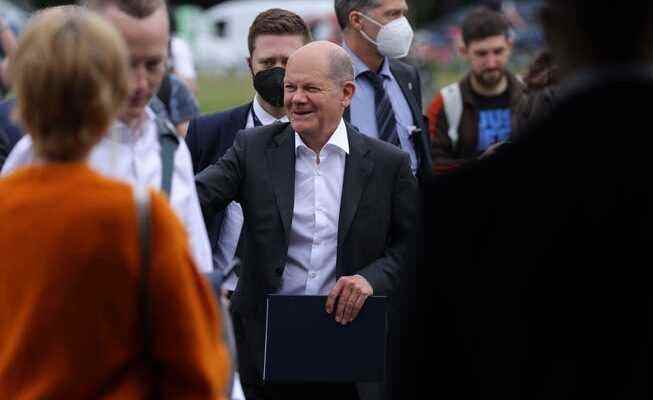The annual high mass of correct consciousness takes place in Berlin. The Chancellor promises digital administration, fast Internet for everyone, but strict requirements for network operators and platforms. He declares war on “powerful lobby groups”.
On the way to the “Republica”: the German Chancellor Olaf Scholz.
What Angela Merkel recently was the Berliner Ensemble, Olaf Scholz was to become the “Republica”: a rhetorical ball pool, a feel-good event among like-minded people, an island of mutual self-satisfaction. The three-day meeting of the “digital society”, the 16th edition since 2007, guarantees all guests a “relaxed togetherness”. For the chancellor, the short guest performance there was almost as relaxing as his predecessor’s excursion to a Berlin theater stage, where she had recently encountered waves of sympathy when she was questioned by an enthusiastic journalist.
Olaf Scholz was by no means the only minister in the current federal government to honor the “largest conference of its kind in Europe”. Transport and Digital Minister Volker Wissing, Family Minister Lisa Paus, Social Affairs Minister Hubertus Heil and Interior Minister Nancy Faeser were also interviewed. A format entitled “Wake up – here comes Lauterbach!” was also announced.
For a short time, however, “Cancelled” was emblazoned at the point in the program where the photo of the Federal Minister of Health could be seen. Lauterbach left for Ukraine this Thursday. SPD Chairwoman Saskia Esken spoke twice. There was no shortage of representatives and members of the Greens, between climate activist Luisa Neubauer, Heinrich Böll Foundation board member Jan Philipp Albrecht and Luise Amtsberg, the Federal Government Commissioner for Human Rights.
One warns, one demands
The organizing Republica GmbH raises a high claim for a total of around 500 events. The “participants” should form a “cross-section of our (digital) society”. If so, the “(digital) society” has a strong leftist and activist streak. Warnings or requests are issued in almost the same number of formats. They warn of the “climate collapse” and explain, in the words of Neubauer, “why we have to continue on the road”. Of course, it is not clear why the thirty-minute lecture “Let’s not fuck this up” is supported by the tax-financed “Deutsche Bundesstiftung Umwelt”.
They continue to warn against the “strategies of the neo-right” in general and the Desiderius Erasmus Foundation, which is close to the AfD, in particular, warns against the “capitalist world”, against racism and Facebook. “Constructive activists” are demanding more integration and migration, inclusion and diversity, more sea rescue in the Mediterranean, more feminism. The “Republica” is a high mass of correct consciousness. The standard ticket costs 235 euros, the business variant 735 euros.
Here and there clever things can be heard. The physicist Dirk Brockmann, who gained some popularity as a modeler during the corona pandemic, advocates “anti-disciplinary thinking” in order to get to the bottom of things. You have to develop the courage to leave things out and “deliberately go into new areas”, beyond pure expertise. Open thinking is more important than the accumulation of knowledge. This is the only way to harvest the essence of things. Lectures devoted to the planned chat control by the EU, the National Regulatory Control Council or the Online Access Act were driven by classic curiosity.
Chat control only with the right measure
In this largely monocultural environment, Scholz charmed, depending on the occasion with an open shirt and no tie, in a dazzling mood. He invoked “our values of freedom, democracy, co-determination and equality in the digital world” and called on the platforms and companies to assume their social responsibility. He did not blame the heavily criticized EU General Data Protection Regulation.
In an interview with Linda Zervakis, the chancellor specified that there was no threat of censorship by internet companies, “it is constantly being curated; wherever there is great responsibility, one cannot free oneself from responsibility». Scholz also relies on pragmatic solutions for chat control, which the European Commission wants to introduce as part of the fight against child sexual abuse: “You have to find the right balance”. The “necessary control” should not interfere too much with private living spaces.
In keeping with the style of his predecessor, Scholz promised to push ahead with the digitization of administration “at the highest speed” and to invest “massively” in digitization in the coming years. The fiber optic and mobile phone networks would be expanded nationwide. Merkel’s promises were no different, although they had not been kept.
How fast is fast internet?
When asked about the discrepancy between what is said and what is done, Scholz passed the buck on to the network operators: “We have private structural responsibility – but we only have a private structure and have omitted responsibility in our regulatory complexes.” In the past, “powerful lobby groups” would have prevented stronger laws. Now the private companies should be legally obliged to provide a comprehensive infrastructure on a large scale.
This Friday, the Federal Council will deal with the right to fast internet. The Chancellor does not see the approval of the new telecommunications law in jeopardy – although the opposition criticizes the specification of 10 megabits per second as too lame.
Finally, Scholz revealed that he rarely orders goods or groceries online. He always has to identify himself as a “prominent person in public life”, and that affects the joy of shopping. Applause was again safe for him.
